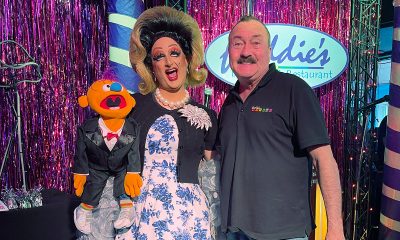Arts & Entertainment
Drag Isn’t Dangerous Telethon raises over $523,000
Final amount raised from the live broadcast was over $523,000. Recording of it will stay online for 48 hours after its conclusion
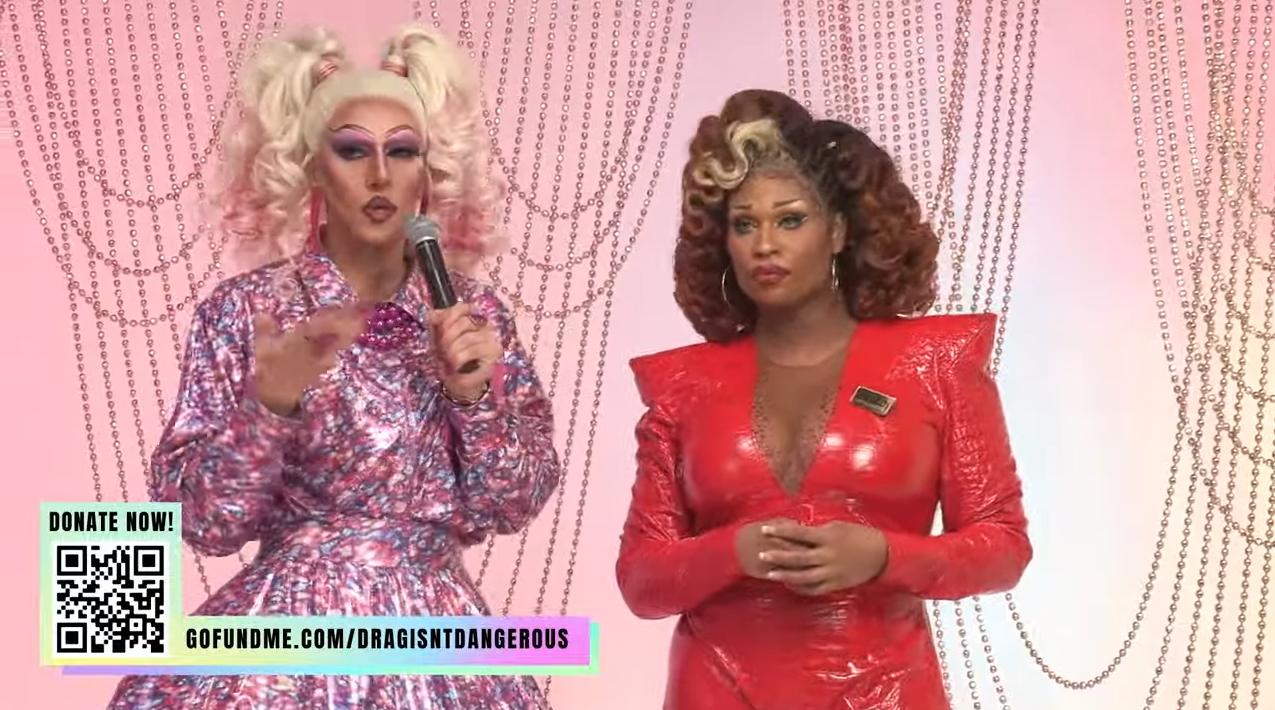
Into the third hour of Drag Isn’t Dangerous, a brief film makes the point that there have been article after article about children molested by church clergy and counselors, yet not a single bill has been proposed tackling that real issue. Then there are drag queens. Drag queens have never harmed a child, and there are no articles implying that they have. Yet … yet … state after state, bill after bill are going after drag queens.
With this telethon event, drag queens and all that they have inspired, have sent the message: They are not going to take this shit anymore. Clips of rightwing pundits and commentators were presented and the ignorant hatred expressed in each clip is both at once chilling, and pathetic.
The message of hate is juxtaposed with segments like one featuring “RuPaul Drag Race” alum Nina West. West told the story about her adventures doing storybook hours at Columbus, Ohio, libraries for children. It should be pointed out that the Nina West brand is one of classiness and kindness. She moved her popular book readings onto Instagram. The first hour where she did so was wonderful.
The second hour was not.
The audience turned “dark, terrifying and threatening.” Then it all got very personal. People showed up at his house where he was broadcasting and blew eardrum breaking airhorns outside his windows. They then started a campaign of harassment and doxing, targeting him, his parents and his sister. Signs appeared in his yard accusing him of being a groomer.
Last December he embarked on a Drag Christmas tour. The tour encountered protesters, bomb threats and required police escorts.
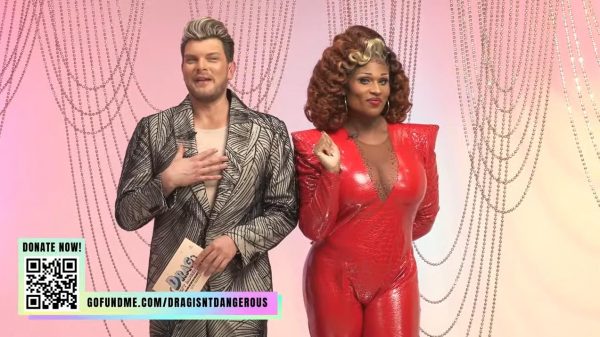
Hosted by Justin Martindale and Peppermint with a co-location hosted by Alaska and Adam Shankman, the telethon team declared a goal target of $250,000 for the evening. The evening was filled with performances from some of the Drag community’s best. Kicking off the evening were songs by Trixie Mattel and Alaska. The online crowd was gobsmacked with exclamations like “legends!” , “fierce!” “That voice!”.
The telethon was a recreation of the traditional telethon style with a phonebank of drag celebrities womaning the phones. Instead of the phone banks of years gone by the receptionists were not the first point of entry to make donations. In this modern version, donors first register their donation on the gofundme application and then are connected to the celebrity to receive thanks and conversation. Phone bank stars included Candis Cayne, Jinx Monsson, Ginger Minge, Laganja Estranja Trinity the Tuck, Monet Exchange and Queer Eye OG Jai Rodriguez.
As of 4:30 p.m., $55,000 had been raised.
Celebrity cameos and interviews were generously sprinkled through the broadcast. Many of them expressed gratitude and awe for the talents and artistic contributions of drag. Still others were downright angry. “I will f*ck anyone who messes with you,” Charlize Theron declared.
“Drag isn’t dangerous, but Leslie Jones IS!” Leslie Jones fumed.
Sarah Silverman also did not mince words. “It is an invented ‘problem’. It creates a REAL problem for the marginalized. I would trust RuPaul before any of you (Republican) hate mongers.” To the drag community, she declared, “If they come for you, they will have to come through me first.”
“Lawmakers are terrified of how bright we are shining,” Adam Lambert stated affirmingly.
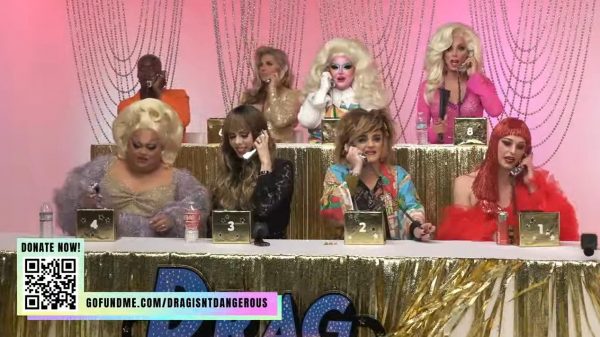
As of 4:50 p.m. $100,000 had been raised.
Donors were interviewed through the phonebank. Jai Rodriguez had an impromptu conversation with a young woman who had come out as queer that day. Even though her experience has been “tough”, she wanted to celebrate her landmark day by donating.
Michele Visage gave RuPaul visibility and spoke from her heart. “I wish I could say that I am glad to be here,” she started. “I am appalled I have to be at something called ‘Drag Isn’t Dangerous.’ Imagine a world where dancers are told they can’t dance; imagine a world where artists are told they cannot take paint to canvas…because it is ‘bad for children.’ That is what is happening to drag right now.”
As of 5:40 p.m., $205,000 had been raised. Jinx Monsson whipped out her own checkbook and wrote a check for $10,000.
Other celebrities added perspective to the issue. Ocean Kelly stated, “They want us to stay quiet. Watching a drag queen won’t make a child queer. If a child is queer, it is because they are … queer.”
Billy Eichner discussed the historical use of scapegoats as distractions. “It is not new, but it is urgent and dangerous,” he warned. “We need to be relentless and loud,” he instructed.
Oscar winner Marcia Gay Harden demonstrated her queer chops by publicly outing her entire family. “All my children are queer,” she declared. “One is nonbinary, one is gay. My first boyfriend was gay and my conservative Naval Officer dad loved him. “ Of the drag controversy she said, “Why are we having to advocate for creativity and imagination? It is so fear-based. We know what love is.”
As of 7:38 p.m., half a million dollars had been raised.
The movement has started and this first outing is not yet over. Recording of it will stay online for 48 hours after it concludes.
Go here for tickets and then receive you email with the telethon link: https://www.moment.co/dangerous/dragisntdangerous-drag-isnt-dangerous-live
As for the end of the Telethon, Ginger Minge show stopped with the classic “I Am What I Am” from La Cage.
I don’t want praise I don’t want pity
I bang my own drum
Some think it’s noise I think it’s pretty
And so what if I love each sparkle and each bangle
Why not try to see things from a different angle
Your life is a sham til you can shout out
I am what I amI am what I am
And what I am needs no excuses
I deal my own deck
Sometimes the ace sometimes the deuces
It’s my life that I want to have a little pride in
My life and it’s not a place I have to hide in
Life’s not worth a danm til you can shout out
I am what I am
********************************************************************
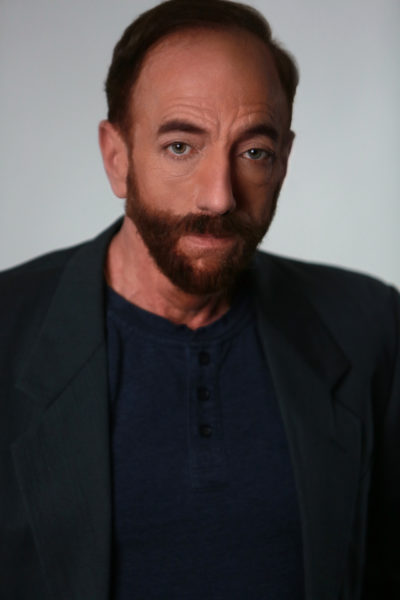
Rob Watson is the host of the popular Hollywood-based radio/podcast show RATED LGBT RADIO.
He is an established LGBTQ columnist and blogger having written for many top online publications including The Los Angeles Blade, The Washington Blade, Parents Magazine, the Huffington Post, LGBTQ Nation, Gay Star News, the New Civil Rights Movement, and more.
He served as Executive Editor for The Good Man Project, has appeared on MSNBC and been quoted in Business Week and Forbes Magazine.
He is CEO of Watson Writes, a marketing communications agency, and can be reached at [email protected] .

Team DC, the umbrella organization for LGBTQ-friendly sports teams and leagues in the D.C. area, held its annual Night of Champions Awards Gala on Saturday, April 20 at the Hilton National Mall. The organization gave out scholarships to area LGBTQ student athletes as well as awards to the Different Drummers, Kelly Laczko of Duplex Diner, Stacy Smith of the Edmund Burke School, Bryan Frank of Triout, JC Adams of DCG Basketball and the DC Gay Flag Football League.
(Washington Blade photos by Michael Key)




















The 2024 National Cannabis Festival was held at the Fields at RFK Stadium on April 19-20.
(Washington Blade photos by Michael Key)
















Covering the @NatlCannaFest at RFK Stadium for @WashBlade . Stop by the LGBTQ+ booth and pick up a paper if you are here. pic.twitter.com/is7hnsaPns
— Michael Patrick Key (@MichaelKeyWB) April 20, 2024
Theater
‘Amm(i)gone’ explores family, queerness, and faith
A ‘fully autobiographical’ work from out artist Adil Mansoor

‘Amm(i)gone’
Thorough May 12
Woolly Mammoth Theatre
641 D St., N.W.
$60-$70
Woollymammoth.net
“Fully and utterly autobiographical.” That’s how Adil Mansoor describes “Amm(i)gone,” his one-man work currently playing at Woolly Mammoth Theatre.
Both created and performed by out artist Mansoor, it’s his story about inviting his Pakistani mother to translate Sophocles’s Greek tragedy “Antigone” into Urdu. Throughout the journey, there’s an exploration of family, queerness, and faith,as well as references to teachings from the Quran, and audio conversations with his Muslim mother.
Mansoor, 38, grew up in the suburbs of Chicago and is now based in Pittsburgh where he’s a busy theater maker. He’s also the founding member of Pittsburgh’s Hatch Arts Collective and the former artistic director of Dreams of Hope, an LGBTQ youth arts organization.
WASHINGTON BLADE: What spurred you to create “Amm(i)gone”?
ADIL MANSOOR: I was reading a translation of “Antigone” a few years back and found myself emotionally overwhelmed. A Theban princess buries her brother knowing it will cost her, her own life. It’s about a person for whom all aspirations are in the afterlife. And what does that do to the living when all of your hopes and dreams have to be reserved for the afterlife?
I found grant funding to pay my mom to do the translation. I wanted to engage in learning. I wanted to share theater but especially this ancient tragedy. My mother appreciated the characters were struggling between loving one another and their beliefs.
BLADE: Are you more director than actor?
MANSOOR: I’m primarily a director with an MFA in directing from Carnegie Mellon. I wrote, directed, and performed in this show, and had been working on it for four years. I’ve done different versions including Zoom. Woolly’s is a new production with the same team who’ve been involved since the beginning.
I love solo performance. I’ve produced and now teach solo performance and believe in its power. And I definitely lean toward “performance” and I haven’t “acted” since I was in college. I feel good on stage. I was a tour guide and do a lot of public speaking. I enjoy the attention.
BLADE: Describe your mom.
MANSOOR: My mom is a wonderfully devout Muslim, single mother, social worker who discovered my queerness on Google. And she prays for me.
She and I are similar, the way we look at things, the way we laugh. But different too. And those are among the questions I ask in this show. Our relationship is both beautiful and complicated.
BLADE: So, you weren’t exactly hiding your sexuality?
MANSOOR: In my mid-20s, I took time to talk with friends about our being queer with relation to our careers. My sexuality is essential to the work. As the artistic director at Dreams of Hope, part of the work was to model what it means to be public. If I’m in a room with queer and trans teenagers, part of what I’m doing is modeling queer adulthood. The way they see me in the world is part of what I’m putting out there. And I want that to be expansive and full.
So much of my work involves fundraising and being a face in schools. Being out is about making safe space for queer young folks.
BLADE: Have you encountered much Islamophobia?
MANSOOR: When 9/11 happened, I was a sophomore in high school, so yes. I faced a lot then and now. I’ve been egged on the street in the last four months. I see it in the classroom. It shows up in all sorts of ways.
BLADE: What prompted you to lead your creative life in Pittsburgh?
MANSOOR: I’ve been here for 14 years. I breathe with ease in Pittsburgh. The hills and the valleys and the rust of the city do something to me. It’s beautiful, it’ affordable, and there is support for local artists. There’s a lot of opportunity.
Still, the plan was to move to New York in September of 2020 but that was cancelled. Then the pandemic showed me that I could live in Pittsburgh and still have a nationally viable career.
BLADE: What are you trying to achieve with “Amm(i)gone”?
MANSOOR: What I’m sharing in the show is so very specific but I hear people from other backgrounds say I totally see my mom in that. My partner is Catholic and we share so much in relation to this.
I hope the work is embracing the fullness of queerness and how means so many things. And I hope the show makes audiences want to call their parents or squeeze their partners.
-

 District of Columbia5 days ago
District of Columbia5 days agoNew D.C. LGBTQ+ bar Crush set to open April 19
-

 South America3 days ago
South America3 days agoDaniel Zamudio murderer’s parole request denied
-

 Maryland4 days ago
Maryland4 days agoMontgomery County police chief discusses arrest of trans student charged with planned school shooting
-
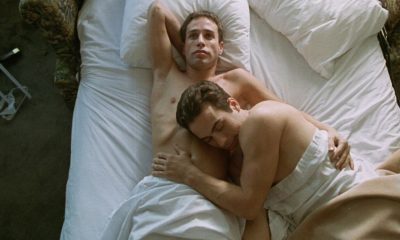
 Movies5 days ago
Movies5 days agoAfter 25 years, a forgotten queer classic reemerges in 4K glory



